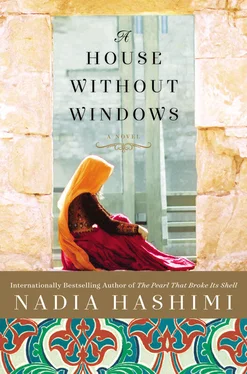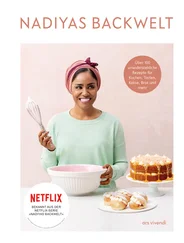“But Qazi- sahib, this is not right. Don’t make me go through the pain of an appeal. How could you find her guilty and then—”
The judge waved a dismissive hand in the prosecutor’s direction. The electric fan buzzed in the background.
“The time for arguments has passed. I strongly suggest you focus on your next case,” he said. He closed a manila folder on his desk and rested his two open hands on it protectively. “This decision is final.”
The prosecutor blew through pursed lips. He wouldn’t appeal, he knew. This case was rife with inconsistencies and he wanted nothing more than to move on.
It was just starting to sink in. Gulnaz’s hands pressed harder against Zeba’s. Zeba looked into her mother’s eyes, her green irises like tiny prisms through the pooled tears. It was the greatest gift for them. It was the chance to start anew, their secrets no longer hidden in the folds of their skirts. Judgment Day had come, and Zeba would be free to embrace the four angels she’d been kept from all these months. Anything she ate would be sweeter than the fruits of Paradise. Anything she drank would be richer than the river of unspoilable milk. Zeba would enjoy the humble heaven that was this world.
Zeba would live.
YUSUF SCANNED THROUGH HIS CALL LOG AND PRESSED THE green button when he saw her name. It was Thursday evening, and the events of the sentencing were still fresh on his mind. The prosecutor had walked out without saying a word, a sulk that did not go unnoticed by Qazi Najeeb. Gulnaz and Zeba had pressed their foreheads together and sobbed. Yusuf had looked at the judge, but he had already risen from his chair and mumbled something about seeing to another case. He had paused only to put a hand on Yusuf’s shoulder and nod. He said nothing more.
When Sultana answered the phone, Yusuf pressed his back against the seat of the taxi in relief.
“She’s free,” he said, his words sparse so that he could get them out without his voice breaking. “Zeba’s free.”
“Honestly? You’re serious?” Sultana exclaimed.
“Yes, very serious. It happened just this afternoon. If I hadn’t been there, I wouldn’t believe it myself!”
“But. . but. . why? What did he say?”
Yusuf recounted the judge’s reasoning, a new jurisprudence incongruous with his age and the traditions of the city. Yusuf was left to wonder what constellation of influences had pushed the judge to set Zeba free.
“That’s astounding.”
“It most certainly is. Listen, I don’t know what you told the judge and whether or not it had anything to do with this afternoon. What did you tell him?”
“Yusuf, I didn’t say much. I only told him that I was thinking of interviewing the folks from Zeba’s village and investigating the rumors circulating around her husband. He asked me why I would want to do that and I said because I thought the dead man deserved to have his name cleared if all the horrible things being said about him were lies. I asked Qazi Najeeb for his opinion on the matter, but he refused to say anything else. He was in a hurry to get off the phone.”
“Something clicked, Sultana. I don’t know what it was, but something worked.”
The taxi had just rounded the corner of his road. His apartment was half a block ahead, and it was that time of day that men were milling about the streets. The electronic rhythm of a pop song spilled out of a kebab shop along with the aroma of charred meat. A young boy offered to shine the shoes of pedestrians.
“She’s really going to go free? Completely?”
Sultana’s disbelief echoed the thoughts in his own head. Had Qazi Najeeb been turned by the mullah’s entreaties? By Gulnaz’s pleas? Or had he feared the attention that Sultana might bring to the case, revealing what kind of man Kamal was and inviting criticism of the judge who dared punish the defender of the Qur’an? There was also the possibility that the judge had reached this conclusion based on the truth, having finally received all the facts, even if it had not come in the form of the defense’s case.
“I wanted to thank you for what you did. That phone call you made, it just might have been the thing that got to him.”
“I doubt it.” Sultana sighed. “He didn’t seem too affected by what I said. He sounded annoyed that I was interrupting his evening, honestly.”
“It’s not the way I imagined the case going, but it is the result I wanted. I’m happy about that part.”
“That’s the frustration of trying to do something good here. Even when there’s a real judicial process, the result can make you think we’ve gone back to Taliban times. There was a woman lashed in Ghor Province just this week for zina . Her case went through a real court and in the end, an audience of men watched as they carried out one hundred strikes against her.”
But Yusuf wasn’t discouraged by that bit of news or by the way his attempts to bring the procedural code to life had failed in Qazi Najeeb’s office. He understood that courtrooms could look like anything, briefs could be handwritten and scribbled on sheets torn from a composition notebook. He knew arrest registries could be works of fantasy and that zina could be deemed more criminal than murder. It only meant there was more work yet to be done.
“And what’s next for you?” Sultana asked as if she’d read his mind. “Back to the United States?”
“No, not yet,” Yusuf replied, smiling to hear Sultana ask about his plans. His mother would have the same question for him, though she would frame it more as a demand. He would go back to New York. . eventually. He would be back on his parents’ sofa soon enough — maybe even in time to hold his new niece or nephew — but it wouldn’t be this minute. “I think I’m going to stick around for a while.”
“You are, really?” Sultana asked, a hint of playfulness to her voice.
“Absolutely. So if you have any other questions you want to ask me, I’m still available.”
The taxi stopped at the door of Yusuf’s apartment building. He could see the awning of the gym down the block and made a mental note to get back there later today, feeling a boost of energy. He slipped the cabdriver a few bills and stepped into the street. The smell of diesel and freshly baked bread hung in the air.
“Good to know, Yusuf- jan, ” Sultana said. That she’d addressed him by his name and in such a familiar way was not lost upon him. It was the way things were done here — the land where rumors, hints, and insinuations were as solid as the mountains that contained them.
THE CHILDREN HAD BEEN DELIVERED TO HER A WEEK AFTER HER release, brought to her by Tamina, who did not dare step foot in her brother’s home. She’d come in the evening, once the sun had set, arriving in a taxi that parked at the end of the block. She’d paid the taxi driver to wait for her, knowing it was costing more than she and Mateen could afford, but she did not want to be seen by the neighbors whose ears prickled for news from the home of the freed murderess.
The girls had fallen into Zeba’s arms. Basir had stood next to his mother, nestling his head against her side at first, then pressing his face into the sleeve of her dress to blot his tears.
Zeba had turned to thank Tamina, who stood straight as steel.
“I think it’s best you stay away from me,” she’d said, staring at the backs of the girls’ heads. “We are nothing to each other anymore.”
“Tamina- jan, I am so grateful that you—”
“Don’t say anything, please. There’s nothing to say. I did what needed to be done. That’s what a mother does, I think. We do whatever it is God asks us to do.”
Читать дальше











